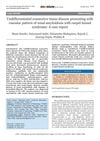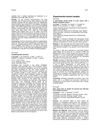 August 2023 in “JOJ dermatology & cosmetics”
August 2023 in “JOJ dermatology & cosmetics” Antibiotics often cause skin reactions, making them a major health concern.
 August 2023 in “Physician's journal of medicine”
August 2023 in “Physician's journal of medicine” Hashimoto thyroiditis is an autoimmune disease that can lead to an underactive thyroid and is treated with medication and sometimes diet changes or surgery.
 July 2023 in “International journal of pharmacognosy and life science”
July 2023 in “International journal of pharmacognosy and life science” The herbal hair oil made from various plants might be a good alternative to synthetic hair loss treatments.
 March 2023 in “Clinical, cosmetic and investigational dermatology”
March 2023 in “Clinical, cosmetic and investigational dermatology” IL-33 is linked to hair follicle damage in psoriasis and could be a treatment target for hair loss in this condition.
 March 2023 in “Journal of pharmacognosy and phytochemistry”
March 2023 in “Journal of pharmacognosy and phytochemistry” Unripe fruits of three banana species have many health-boosting compounds useful for medicine.
 October 2022 in “Journal of experimental and clinical medicine”
October 2022 in “Journal of experimental and clinical medicine” Repurposing existing drugs for COVID-19 shows promise but requires more research to confirm effectiveness.
 January 2022 in “Medical research archives”
January 2022 in “Medical research archives” Taking vitamin D might improve life for MS patients and reduce skin side effects from alemtuzumab treatment.
 July 2021 in “Dermatology archives”
July 2021 in “Dermatology archives” Methotrexate may effectively and safely treat hair loss in children, with notable improvement after 12-15 months.
 October 2020 in “Veterinary Dermatology”
October 2020 in “Veterinary Dermatology” New treatments and diagnostic methods for various animal skin conditions showed promising results.
 January 2019 in “ARC journal of pharmaceutical sciences”
January 2019 in “ARC journal of pharmaceutical sciences” Acne can be managed with various treatments and requires psychological support due to its emotional impact.
 January 2019 in “SAGE Open Medical Case Reports”
January 2019 in “SAGE Open Medical Case Reports” A scalp biopsy revealed systemic amyloidosis in a woman who initially seemed to have a common hair loss condition.
 April 2018 in “The journal of investigative dermatology/Journal of investigative dermatology”
April 2018 in “The journal of investigative dermatology/Journal of investigative dermatology” Biotrinine® may be an effective treatment for chronic hair loss.

Botulinum toxin type A significantly reduces scalp psoriasis severity compared to placebo.
 January 2017 in “Springer eBooks”
January 2017 in “Springer eBooks” Eating a balanced diet with specific nutrients can help manage menopause symptoms and prevent related health issues.
 September 2015 in “Actas Dermo-Sifiliográficas”
September 2015 in “Actas Dermo-Sifiliográficas” People with advanced chronic kidney disease often have skin problems, which can be treated with various medications and procedures to improve their quality of life.
 January 2014 in “International Journal of Case Reports and Images”
January 2014 in “International Journal of Case Reports and Images” A woman with undifferentiated connective tissue disease was diagnosed with renal amyloidosis and carpal tunnel syndrome.
 November 2012 in “Econometric Theory”
November 2012 in “Econometric Theory” Herman Bierens had a successful career in econometrics, contributed to education, and plans to continue research after retirement.
 September 2012 in “Emergency medicine news”
September 2012 in “Emergency medicine news” Manuka honey is effective for treating wounds and burns.
 April 2012 in “Informa Healthcare eBooks”
April 2012 in “Informa Healthcare eBooks” Lichen planopilaris is a rare, chronic condition causing hair loss, mainly in middle-aged women, and early treatment is important to prevent permanent baldness.
 March 2012 in “Journal of The American Academy of Dermatology”
March 2012 in “Journal of The American Academy of Dermatology” Higher levels of certain nerve-related proteins are linked to hair loss in women with scalp pain.
 September 2009 in “Pediatric Dermatology”
September 2009 in “Pediatric Dermatology” UVB is good for a skin condition in Asian kids, a lotion works for head lice, a drug helps with a skin blistering disorder, a foam reduces itchiness in skin inflammation, birthmarks can be more widespread, and criteria for a neurocutaneous disorder were agreed upon.

The document concludes that Syndromes of Severe Insulin Resistance are rare disorders with limited treatment options.
 November 2004 in “John Wiley & Sons, Ltd eBooks”
November 2004 in “John Wiley & Sons, Ltd eBooks” Insulin resistance is linked to PCOS and can lead to other health issues, but treatments like metformin can help manage symptoms.
 October 2004 in “Radiotherapy and oncology”
October 2004 in “Radiotherapy and oncology” Active vitamin D3 might protect hair follicles from radiation damage.
 July 2003 in “British Journal of Dermatology”
July 2003 in “British Journal of Dermatology” Some skin conditions are associated with other serious diseases, and office microscopy may miss many fungal infections.
 July 2002 in “Australasian Journal of Dermatology”
July 2002 in “Australasian Journal of Dermatology” A woman with lupus had hair loss and skin issues that were successfully treated with medications.
 January 1998 in “Lasers in Surgery and Medicine”
January 1998 in “Lasers in Surgery and Medicine” Lasers are effective and safe for various medical treatments, including cancer, wound healing, and skin conditions.
 January 1993 in “Journal of Dermatological Treatment”
January 1993 in “Journal of Dermatological Treatment” Most people who volunteered for a health study had medical issues, showing the need for careful screening before trials.
 April 2018 in “Journal of Investigative Dermatology”
April 2018 in “Journal of Investigative Dermatology”  1 citations,
October 2023 in “Journal of clinical psychopharmacology”
1 citations,
October 2023 in “Journal of clinical psychopharmacology” Divalproex sodium can cause pleural effusion, which stops when the drug is discontinued.






























